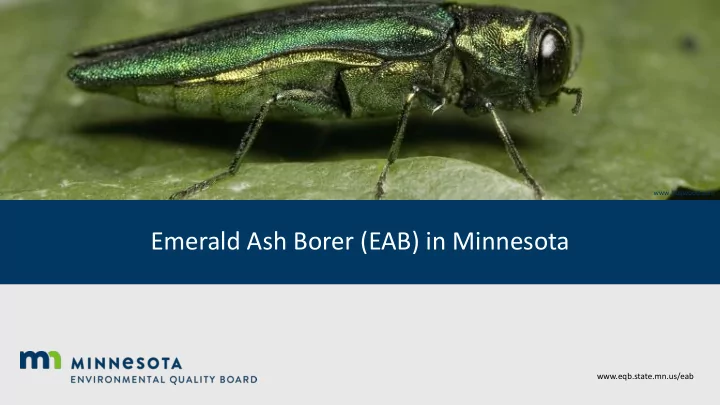

www.bugwood.com Emerald Ash Borer (EAB) in Minnesota www.eqb.state.mn.us/eab
Page 4 Introduction to the Report At Risk: • Over 1 billion ash trees • Environmental, economic, and cultural impacts Duluth, Minnesota
Page 4 Key Recommendations • Slow the spread • Support communities • Manage ash wood material • Lead, engage, and collaborate www.bugwood.com
• How well does the report capture the complexity and offer a practical strategy for addressing the threat of emerald ash borer? • Considering the information in the report, how can we move the issue forward? • What does success look like and how should we measure, and/or monitor it? Key Questions
Page 5 www.bugwood.com What is EAB? Mark Abrahamson | Director of Plant Protection, MDA www.mda.state.mn.us/eab
What is EAB?
What is EAB?
What is EAB? % Tree Mortality EAB Population Size EAB populations grow slowly at first but then Many trees may die faster and faster in a short amount of time when EAB populations are high 0 2 4 6 8 10 12 Years Since Introduction
Page 6-11 What are the Concerns? Community Forests and Ash Forests Gary Michael | Cooperative Forest Management Supervisor, DNR www.dnr.state.mn.us/invasives/terrestrialanimals/eab
Community Forests • Nearly 3 million community ash trees • 1-in-5 community forest trees are ash • Up to 60% ash in some communities • EAB kill rate over 99% • Kills saplings down to 1” in diameter 10
Community Forests and Citizens The Issue/ The Need • Communities need resources to: o Inventory their community forests o Make management plans o Treat and remove ash o Plant diverse replacement trees o Educate residents o Help homeowners 11
Ash Forests • Over 1 billion ash trees statewide • 1 million acres of ash forest statewide • 2 nd most common tree • Minnesota has more ash than any other state
Page 9-11 Ash Forests The Issues • Ecological Concerns o Hydrology – e.g. “swamping” o Habitat loss o Reforestation • Economic Concerns o Markets o Limited harvest time - winter Blah
Page 11-14 What are the Concerns? Ash Wood Material Management Frank Kohlasch | Air Quality Program Manager, MPCA
Page 11
Page 16 Key Recommendations
Page 17-19 Key Recommendation – Slow the Spread Mark Abrahamson | Director of Plant Protection, MDA
Slow the Spread www.mda.state.mn.us/eab
Slow the Spread 100% % of Counties Infested with EAB by Years of Infestation 80% Average Minnesota 60% 40% 20% Updated 11/18/2019 0% 1 2 3 4 5 6 7 8 9 10 11 12 13 14 15 16 17 18 Years of Infestation
Page 17 Slow the Spread 90 Projected Spread of EAB in Minnesota 80 100% of national 70 Number of EAB Infested Counties 50% 60 33% 50 Projected 20% 40 30 Actual spread rate in 20 Minnesota 10 0 2009 2011 2013 2015 2017 2019 2021 2023 2025 2027 2029 2031 2033 2035 2037 2039
Page 20-21 Key Recommendation – Support Communities Gary Michael | Cooperative Forest Management Supervisor, DNR
Page 20-21 Support Communities • Increase technical and financial assistance to communities o Inventory o Management Plans and Implementation assistance o Promote Diversity o Provide training
Page 22 Key Recommendation – Manage Ash Wood Material Frank Kohlasch | Air Quality Program Manager, MPCA
Page 23 Key Recommendation – Lead, engage and collaborate Kristin Mroz | Environmental Quality Board
Page 23 Lead, Engage and Collaborate • Continue statewide planning, coordination and support • Advance needed research • Report on progress
EAB in Minnesota Gina Hugo, Government Relations Committee Chair MN Forestry Association MN Shade Tree Advisory Committee
• Prioritize EAB Management & Preparation Statewide Recommendations • Support for Research in Natural Ash Systems • Develop Markets for Ash Material
Lessard-Sams Bonding USFS Pass through DNR LCCMR General Fund LCCMR
• Prioritize EAB Management & Preparation Statewide Recommendations • Support for Research in Natural Ash Systems • Develop Markets for Ash Material
Support a Supplemental Appropriation
Click to edit Master title style Hennepin County Forestry Hennepin County Environment and Energy
www.hennepin.us/trees
Analysis Filter Selection 18 analysis filter data sets compiled into 7 analysis filter groups: Environmental, Population, Income, Employment, Education, Housing, Health
Utilization • Inform and prioritize • Inform • Cities • Affordable housing • Schools Ash Ash Ash Ash Ash Ash Autumn Ridge Apartments 6300 Boone Ave N Brooklyn Park, MN 55428
Findings • Public vs Private Property • Public Safety • Removals on Private Property • Planting on Private Property • Tree Care • Future Issues Hennepin County Environment and Energy
Questions? Dustin Ellis Email: Dustin.ellis@Hennepin.us Hennepin County Environment and Energy
Page 14 St. Paul Cogeneration & Environmental Wood Supply
Environmental Wood Supply: Processing Tree Waste Into Biofuel
Minnesota Counties Impacted by Emerald Ash Borer
Increasing Impact of EAB – YTD 2019 • Estimated 30% of our brush and log intake identified as being EAB related. • 52% of tree waste from the City of Saint Paul is EAB related (2017-18 avg. 23%) • EWS is averaging a 51% increase in delivered tree waste compared to the past 5 years.
Resolution • Approve the 2019 Emerald Ash Borer in Minnesota report • Support cross-agency work to implement recommendations • Convene future meetings to monitor progress and invite public input
• How well does the report capture the complexity and offer a practical strategy for addressing the threat of emerald ash borer? • Considering the information in the report, how can we move the issue forward? • What does success look like and how should we measure, and/or monitor it? Key Questions
Recommend
More recommend